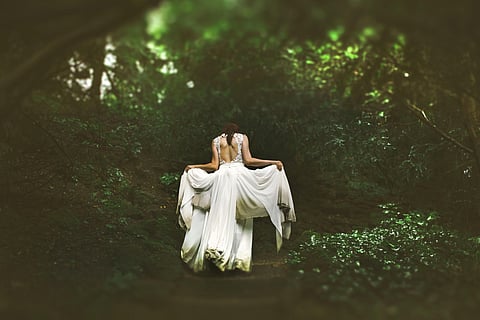
- LIFESTYLE
- FASHION
- FOOD
- ENTERTAINMENT
- EVENTS
- CULTURE
- VIDEOS
- WEB STORIES
- GALLERIES
- GADGETS
- CAR & BIKE
- SOCIETY
- TRAVEL
- NORTH EAST
- INDULGE CONNECT

Across all cultures, wedding outfits are more than just attire—they are symbols of cultural continuity, personal identity, and a shared celebration of love and unity.
Western wedding traditions: symbolism in white
In many Western cultures, the bride traditionally wears a white wedding gown, a custom that gained prominence in the 19th century with Queen Victoria's marriage to Prince Albert in 1840. While white symbolises purity and innocence in these cultures, the tradition has evolved to represent elegance, timelessness, and a fresh new beginning.
Western wedding gowns are often characterised by their intricate lacework, long trains, and veil accessories, which complement the celebration’s ceremonial grandeur. In recent years, brides have moved away from strictly white, experimenting with shades like ivory, champagne, and even bold colors, reflecting the modern bride's personal style. These dresses are frequently paired with formal tuxedos or suits for the groom, maintaining a sharp contrast in formality.
Eastern and indigenous traditions: rich colours and symbolism
Across the Eastern world and in indigenous cultures, wedding attire varies dramatically, often reflecting long-held traditions, cultural identity, and local customs. In India, for example, the sari is a prominent bridal outfit, known for its vibrant colours, intricate designs, and symbolism.
The colour red is particularly popular, as it represents prosperity, love, and fertility. Similarly, in China, the bride traditionally wears a red qipao or cheongsam, symbolising good fortune and happiness. This rich colour contrasts the more muted tones worn in the West, emphasizing a different cultural approach to what a wedding symbolises—joy, celebration, and the joining of two families.
In many African cultures, traditional wedding attire is deeply intertwined with heritage, often handmade and adorned with beading, embroidery, and vibrant patterns that hold personal and cultural significance. For instance, the Yoruba people of Nigeria celebrate their weddings with the bride donning an "Aso Ebi," a matching outfit that signifies unity among family and friends, often made from colourful, patterned fabrics.